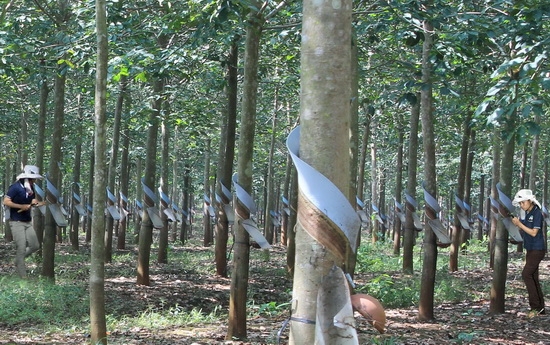Hoang Anh-Gia Lai refutes accusations

photo source: hagl.com.vn
HAGL chairman Doan Nguyen Duc last week denied Global Witness Organisation accusations of land and forest grabs in Laos and Cambodia, earlier carried by internationally respected media such as the BBC.
“We will not sue, although the accusations have harmed our image and share price. We’ll show them that we’ve done nothing wrong. We do not destroy the forest nor trade logs. Meanwhile, our projects have generated jobs for tens of thousands of local residents. If we are found to be committing violations, we are willing to fix them, but I’m confident that we have not.”
Global Witness alleged HAGL and Vietnam Rubber Group (VRG) had destroyed vast tracks of forest in Laos and Cambodia for rubber plantations, and devastated local livelihoods and the environment.
Duc said his group was working to obtain a Forest Management Certificate from Forest Stewardship Council (FSC) via Bureau Veritas, a global leader in testing, inspection and certification. FCS was recommended by the World Bank the World Bank’s International Finance Corp for certification.
IFC has a stake in the investment fund Vietnam Enterprise Investment Limited (VEIL), managed by Dragon Capital, which in turn has an investment in HAGL.
Hannfried von Hinderburg, head of communications, IFC East Asia and the Pacific, wrote to VIR last week: “IFC works with financial intermediaries, such as funds, because they can contribute to inclusive and sustainable financial markets that are essential to eradicating poverty and job creation. The multiplier effect of fund investments enables us to support far more enterprises critical to development than we would be able to on our own.
“IFC’s approach to environmental and social risk management when working with funds is to help build the capacity of the fund managers so that they themselves can assess and mitigate their own environmental and social risks. In line with this approach, we have helped and continue to help fund manger Dragon Capital put an environmental and social monitoring system in place that allows them to conduct their own due-diligence and monitoring of their funds’ investments,” he wrote.
Dragon Capital held less than 6 per cent in HAGL, said HAGL board member Vu Huu Dien. He said Deutsche Bank currently had some indirect investments in HAGL through international exchanges. He added and Dragon Capital always demanded HAGL observe the laws of any countries where it did business, and HAGL strictly observed laws.
Global Witness also accused IFC and Deutsche Bank of supporting HAGL’s activities in Cambodia and Laos. Duc said right after Global Witness published the report, IFC representatives flew from Hong Kong to Vietnam to re-appraise HAGL business and they told him they found nothing wrong. Then, IFC advised HAGL about what the group should do next.
Duc said HAGL, or any foreign investor in Laos and Cambodia, had to acquire land upon approval of the two governments. The Laos and Cambodian governments call for investment in poor rural areas with incentives, such as corporate income tax exemptions, in order to improve the conditions of both local people and society, not to make their life worse, as accused by Global Witness.
Duc said Global Witness had also smeared the Lao and Cambodian governments’ reputations.
He said his group had a total of four subsidiaries in Cambodia, and each had less than 10,000 hectares for rubber plantation, because the Cambodian laws state each company cannot have more than that. This proved that Global Witness was wrong when claiming HAGL had more land for rubber as stated by law. Duc added maybe because many companies had “Hoang Anh” as part of their names, but they were not in his group, and Global Witness might have included them in its calculations.
Global Witness claimed HAGL had been given 47,300ha for rubber plantations in Cambodia.
As for Vietnam Rubber Group, it plans to grow 70,000ha of rubber in Laos and Cambodia between now to 2015, taking its total rubber farming area in these two countries to 150,000ha.
Vietnam’s Ministry of Agriculture and Rural Development is in talks with the Cambodian government over expanding the farming area of rubber and industrial plants to 300,000ha.
What the stars mean:
★ Poor ★ ★ Promising ★★★ Good ★★★★ Very good ★★★★★ Exceptional
Latest News
More News
- Pegasus Tech Ventures steps up Vietnam focus (February 05, 2026 | 17:25)
- The generics industry: unlocking new growth drivers (February 04, 2026 | 17:39)
- Vietnam ready to increase purchases of US goods (February 04, 2026 | 15:55)
- Steel industry faces challenges in 2026 (February 03, 2026 | 17:20)
- State corporations poised to drive 2026 growth (February 03, 2026 | 13:58)
- Why high-tech talent will define Vietnam’s growth (February 02, 2026 | 10:47)
- FMCG resilience amid varying storms (February 02, 2026 | 10:00)
- Customs reforms strengthen business confidence, support trade growth (February 01, 2026 | 08:20)
- Vietnam and US to launch sixth trade negotiation round (January 30, 2026 | 15:19)
- Digital publishing emerges as key growth driver in Vietnam (January 30, 2026 | 10:59)















 Mobile Version
Mobile Version